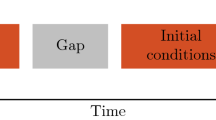Abstract
The use of synthetic data for training machine learning models (ML) in social media domains can address issues such as data availability and bias, but poses challenges, including properly reflecting causal relationships and matching the consistency of real data. In this paper, we explore the benefits and limitations of using synthetic data generated by cognitive agent simulations. By simulating human interactions and social media dynamics, these models can capture constraints and nuances of real-world scenarios. We report initial experiments that show that ML algorithms trained on real data augmented with synthetic data outperform those trained solely on original data, achieving up to 25% improvement in KS distance and RMSE metrics. This approach is applied to two domain problems: predicting code quality based on open-source code discussions and detecting and countering bot attacks on social media platforms. For code quality prediction, we used discussions and patches from the Linux Kernel Mailing List to predict patch reversions. In the bot attack detection problem, synthetic Reddit data helps create realistic social network environments to study interactions between influencers and bots under different conditions. The paper presents empirical evidence supporting the effectiveness of synthetic data in improving ML model performance and introduces an agent-based framework for generating realistic synthetic data for social media experiments. The findings suggest promising avenues for future research and highlight the potential of this approach.
Access this chapter
Tax calculation will be finalised at checkout
Purchases are for personal use only
Similar content being viewed by others
References
Dash agent-based modeling framework. https://github.com/isi-usc-edu/dash/
Assefa, S.A., Dervovic, D., Mahfouz, M., Tillman, R.E., Reddy, P., Veloso, M.: Generating synthetic data in finance: opportunities, challenges and pitfalls. In: Proceedings of the First ACM International Conference on AI in Finance. ICAIF 2020, Association for Computing Machinery, New York, NY, USA (2021). https://doi.org/10.1145/3383455.3422554
van Breugel, B., Kyono, T., Berrevoets, J., van der Schaar, M.: Decaf: generating fair synthetic data using causally-aware generative networks. In: Ranzato, M., Beygelzimer, A., Dauphin, Y., Liang, P., Vaughan, J.W. (eds.) Advances in Neural Information Processing Systems, vol. 34, pp. 22221–22233. Curran Associates, Inc. (2021)
Chavoshi, N., Hamooni, H., Mueen, A.: Debot: Twitter bot detection via warped correlation. In: Icdm, vol. 18, pp. 28–65 (2016)
Eken, B., Palma, F., Ayşe, B., Ayşe, T.: An empirical study on the effect of community smells on bug prediction. Software Qual. J. 29, 159–194 (2021)
Feng, S., Wan, H., Wang, N., Li, J., Luo, M.: Twibot-20: a comprehensive twitter bot detection benchmark. In: Proceedings of the 30th ACM International Conference on Information Knowledge Management, pp. 4485–4494 (2021)
Fornacciari, P., Mordonini, M., Poggi, A., Sani, L., Tomaiuolo, M.: A holistic system for troll detection on Twitter. Comput. Hum. Behav. 89, 258–268 (2018). https://doi.org/10.1016/j.chb.2018.08.008
Hansen, L., Seedat, N., van der Schaar, M., Petrovic, A.: Reimagining synthetic tabular data generation through data-centric AI: a comprehensive benchmark. Adv. Neural. Inf. Process. Syst. 36, 33781–33823 (2023)
Jaipuria, N., et al.: Deflating dataset bias using synthetic data augmentation. In: Proceedings of the IEEE/CVF Conference on Computer Vision and Pattern Recognition (CVPR) Workshops (2020)
Li, L., Fan, Y., Tse, M., Lin, K.Y.: A review of applications in federated learning. Comput. Ind. Eng. 149, 106854 (2020)
de Melo, C.M., Torralba, A., Guibas, L., DiCarlo, J., Chellappa, R., Hodgins, J.: Next-generation deep learning based on simulators and synthetic data. Trends Cogn. Sci. 26(2), 174–187 (2022)
Murić, G., et al.: Large-scale agent-based simulations of online social networks. Auton. Agent. Multi-Agent Syst. 36(2), 38 (2022)
Murtaza, H., Ahmed, M., Khan, N.F., Murtaza, G., Zafar, S., Bano, A.: Synthetic data generation: state of the art in health care domain. Comput. Sci. Rev. 48, 100546 (2023). https://doi.org/10.1016/j.cosrev.2023.100546
Nikolenko, S.I.: Synthetic Data for Deep Learning, vol. 174. Springer, Cham (2021)
Orozco Camacho, A.: A study of social media trolls via graph representation learning (2023)
Puri, R., Spring, R., Patwary, M., Shoeybi, M., Catanzaro, B.: Training question answering models from synthetic data. arXiv preprint arXiv:2002.09599 (2020)
Tregubov, A., Abramson, J., Hauser, C., Hussain, A., Blythe, J.: Modeling cognitive workload in open-source communities via simulation. In: Nardin, L.G., Mehryar, S. (eds.) MABS 2023. LNCS, pp. 146–159. Springer, Cham (2024). https://doi.org/10.1007/978-3-031-61034-9_10
Tsantarliotis, P., Pitoura, E., Tsaparas, P.: Defining and predicting troll vulnerability in online social media. Soc. Netw. Anal. Min. 7, 1–15 (2017)
Uchôa, A., et al.: Predicting design impactful changes in modern code review: a large-scale empirical study. In: 2021 IEEE/ACM 18th International Conference on Mining Software Repositories (MSR), pp. 471–482. IEEE (2021)
Wei, F., Nguyen, U.T.: Twitter bot detection using bidirectional long short-term memory neural networks and word embeddings. In: 2019 First IEEE International Conference on Trust, Privacy and Security in Intelligent Systems and Applications (TPS-ISA), pp. 101–109. IEEE (2019)
Author information
Authors and Affiliations
Corresponding author
Editor information
Editors and Affiliations
Rights and permissions
Copyright information
© 2025 The Author(s), under exclusive license to Springer Nature Switzerland AG
About this paper
Cite this paper
Blythe, J., Tregubov, A. (2025). Synthetic Data Generation for Machine Learning Models with Cognitive Agent Simulations. In: Mathieu, P., De la Prieta, F. (eds) Advances in Practical Applications of Agents, Multi-Agent Systems, and Digital Twins: The PAAMS Collection. PAAMS 2024. Lecture Notes in Computer Science(), vol 15157. Springer, Cham. https://doi.org/10.1007/978-3-031-70415-4_7
Download citation
DOI: https://doi.org/10.1007/978-3-031-70415-4_7
Published:
Publisher Name: Springer, Cham
Print ISBN: 978-3-031-70414-7
Online ISBN: 978-3-031-70415-4
eBook Packages: Computer ScienceComputer Science (R0)




